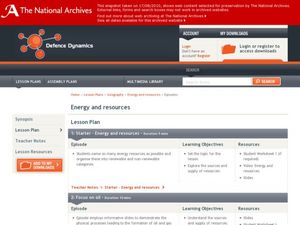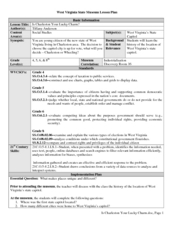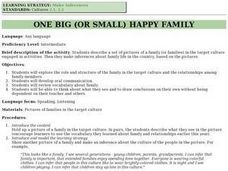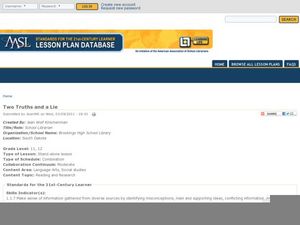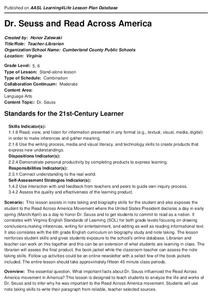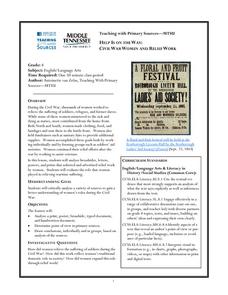Curated OER
Water Quality
Students examine water quality and how to improve it, how to measure it and how it relates to human activities. In this water quality lesson students sample water from different sources, and test the samples.
Curated OER
Exploring the USA and the World with Cartograms
Students investigate cartograms in order to explore the different countries on Earth. In this world geography lesson, students use the Internet to analyze data on different cartograms. Students compare data, such as population density,...
Curated OER
Energy and Resources
Learners identify renewable and nonrenewable resources. In this energy lesson, students explore the consumption issues regarding oil use and consider methods of resource management. Learners research alternative resources and present...
Curated OER
Misleading Graphs
Students explore number relationships by participating in a data collection activity. In this statistics instructional activity, students participate in a role-play activitiy in which they own a scrap material storefront that must...
Curated OER
DNA Models
Learners construct paper model of the DNA molecule. In this genetics lesson, students assemble paper parts that represent nucleotides into a DNA molecule. Extension ideas are also provided.
Curated OER
Slavery, Manumission, and Freedom: Free Blacks in Charleston before the Civil War
Students explore the concept of slavery and manumission through a variety of activities. In this civil rights lesson, students gather information from primary sources, then analyze the politics and historical context of the time....
Curated OER
Is Charleston Your Lucky Charm?
Young scholars determine what makes Charleston, West Virginia unique. In this West Virginia history lesson, students explore the West Virginia History Museum to identify why Charleston became the capitol of the state.
Curated OER
Why Is Our Stream Changing?
Students test turbidity, pH, oxygen content and temperature of local stream. In this earth science lesson, students collect and record data from the experiment. They analyze findings and present it to class.
Curated OER
One Big Happy Family
Students will explore the role and structure of the family in the target culture and the relationships among family members. The skills help learners make connections to language because the information of the lesson uses personal examples.
Curated OER
Are You Thirsty? The Effects of Pollution on Drinking Water
Discuss the availability of clean, plentiful water and the causes of water pollution. In groups, sixth graders discuss problem-solving methods for keeping water clean. They explore the function of water treatment plants and perform...
Curated OER
Infusing Equity by Gender into the Classroom
Students discover the biases between the two genders by comparing males and females in different species. In this gender identity lesson, students research National Geographic Magazine and view videos demonstrating the differences...
Curated OER
Challenge: Skills and Applications Lesson 2.3
In this geometry activity, 10th graders solve logic puzzles. The one page activity contains three questions. Answers are not included.
Curated OER
Two Truths and a Lie: Internet Research Skills
It's tough for high schoolers to assess what is a credible resource and what is not. A helpful resource prompts class members to research a particular topic and record two facts—and create one lie—while documenting the sources. They then...
Inside Mathematics
Marble Game
Pupils determine the theoretical probability of winning a game of marbles. Individuals compare the theoretical probability to experimental probability for the same game. They continue on to compare two different probability games.
American Statistical Association
Bubble Trouble!
Which fluids make the best bubbles? Pupils experiment with multiple fluids to determine which allows for the largest bubbles before popping. They gather data, analyze it in multiple ways, and answer analysis questions proving they...
Curated OER
About Life: The Photographs of Dorothea Lange Going to the Promised Land
To better understand the migrant experience during the Great Depression, pupils analyze two primary resources: photographs by Dorothea Lange and a U.S. Map that shows the Dust Bowl. They compare and contrast Lange's images to Steinbeck's...
Curated OER
Dr. Seuss and Read Across America
What important facts about Dr. Seuss influenced the Read Across America movement...? This is the driving question of a research project that requires scholars to find information about Dr. Seuss' life and work. Class members write a...
Institute of Electrical and Electronics Engineers
Insulators and Conductors
In a classic activity, emerging electricians test various objects for electrical conductivity in a circuit. Each group constructs a simple circuit by following a diagram. Predictions are made and objects are inserted into the circuit,...
Science 4 Inquiry
The Impact of the Sun and Moon on Tides
In 150 BC, Seleucus of Seleucia theorized that the moon causes the tides. Scholars learn about what causes tides by studying the interactions of gravity between the sun, moon, and Earth. They use technology to formalize otherwise...
Syracuse University
Harlem Renaissance
The music and literature of the Harlem Renaissance defined American culture, including its poetry. Using a poem from the period, individuals explore its musical qualities and how it is reflective of the period. Then, they use what they...
Syracuse University
Women's Suffrage Movement
Women gained the right to vote in the twentieth century, but the fight for equality dates back centuries. Using an invitation to an 1874 suffrage convention, eager historians consider the motivations behind supporters of the suffrage...
Middle Tennessee State University
Help Is on the Way: Civil War Women and Relief Work
The role women played in the Civil War, especially in relief efforts, is the focus of this seven-page resource. Groups examine primary source materials to determine how this work reflected and expanded the traditional roles women held in...
Science 4 Inquiry
All the Small Things
Scholars use sorting cards to try to define a pure substance versus a mixture. Risk becomes reward as they observe the differences and create a flowchart sorting matter into mixtures and pure substances (elements and compounds).
Novelinks
Sense and Sensibility: Anticipation Guide Reading Strategy
Begin your discussion about Jane Austen's Sense and Sensibility before you even open the book. Kids fill in a worksheet that lists five statements about the literary themes of the novel, and then discuss their opinions as a group. Once...




